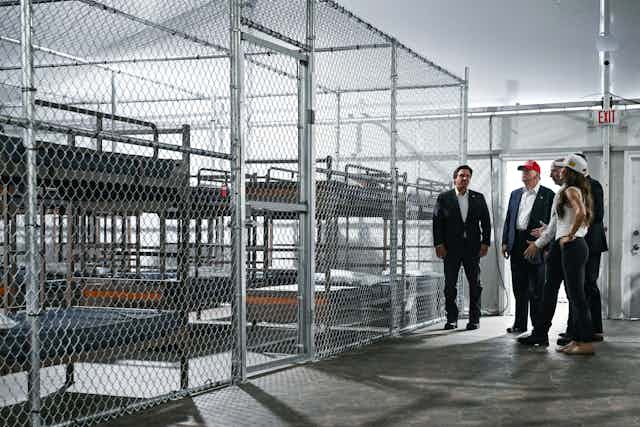
Two Italian nationals with Argentinian dual citizenship remain detained at a controversial immigration facility in Florida's Everglades, dubbed "Alligator Alcatraz," as their families plead for their release. The case has drawn international attention and raised questions about the scope of current U.S. immigration enforcement policies targeting citizens from allied nations.
Fernando Eduardo Artese (63) and Gaetano Cateno Mirabella Costa (45) were apprehended during what appears to be routine immigration checks, with their families claiming they possessed valid documentation at the time of detention. The detention center, officially known as the Broward Transitional Center, has earned its ominous nickname due to its remote location surrounded by alligator-infested waters.
Law Enforcement Perspective
Conservative perspectives, as reported by the Washington Examiner, frame the detentions within the broader context of enhanced immigration enforcement under the current administration. Supporters argue that immigration laws must be applied uniformly regardless of nationality, and that proper documentation verification is essential for national security.
The U.S. Department of Homeland Security has defended the detentions, with spokesperson Tricia McLaughlin stating that Costa overstayed his tourist visa by nearly seven years and Artese remained in the country about a decade past his authorized period. According to DHS, Costa's criminal history includes "arrests for battery on a person 65 years or older, possession of a controlled substance, and marijuana possession."
— Conservative viewpoint reported by Washington Examiner
Costa was reportedly detained by ICE after serving six months in jail for domestic violence against his American ex-wife and possession of prescription drugs. Law enforcement supporters emphasize that consistent application of immigration law is crucial for maintaining the integrity of the system, regardless of the nationality of those involved.
Humanitarian Concerns
Liberal viewpoints, reflected in coverage by outlets like the Washington Post, emphasize concerns about due process and the conditions at detention facilities. Critics argue that the detention of citizens from allied nations like Italy demonstrates an overreach of enforcement powers and raises questions about the proportionality of responses to immigration violations.
According to reports from multiple sources, including CNN and international outlets, the facility has been described by advocates as having "inhuman and degrading" conditions. Detainees and former guards have reported shortages of water, leaky tents, and a mosquito-infested environment at the facility, which was established at a repurposed airport.
— Fernando Eduardo Artese, speaking to Italian media
Artese also described the facility as "a concentration camp" to the Tampa Bay Times, stating "They treat us like criminals, it's a pursuit of humiliation. We're all workers and people fighting for our families." His daughter Carla Artese wrote on a fundraising page that "they treat them like criminals and have no rights" and noted that her father "doesn't even appear like an inmate anywhere" in the system.
Costa's mother told Italian broadcaster RAI that her son appeared at a hearing "with shackles on his feet and shackles on his hands, like a dog." The private nature of many detention facilities has drawn scrutiny, with critics pointing to financial incentives that may encourage prolonged detention rather than swift resolution of cases.
International and Diplomatic Impact
International perspectives, particularly from The Times UK, highlight diplomatic tensions arising from the detention of European nationals. The case has prompted discussions about reciprocal treatment of American citizens abroad and the potential impact on international relations.
The detention has sparked significant political upheaval in Italy, with opposition lawmakers demanding immediate government action. Laura Boldrini, an Italian opposition lawmaker, condemned what she described as "inhuman and degrading" treatment, while Angelo Bonelli claimed the men are "locked in cages" without access to basic rights including legal counsel, adequate water, or proper food.
— Political tensions reported in Italian media
The detention of Italian citizens has prompted diplomatic inquiries, with Italian officials reportedly seeking clarification from U.S. authorities about the circumstances surrounding the arrests and continued detention. The case raises questions about diplomatic protocols and could potentially impact tourism and business relationships between the allied nations.
Economic considerations include the reported increase in tourist visa fees to $435, which some argue creates barriers for legitimate visitors. The tourism industry has expressed concerns about the potential chilling effect of high-profile detention cases on international travel to the United States.
Conclusion
The Italian nationals' case highlights the tension between security concerns and humanitarian considerations in immigration enforcement. While supporters argue for consistent application of immigration laws, critics contend that the current approach prioritizes punishment over efficiency and human dignity.
The resolution of this case will likely be closely watched by international observers and may influence future diplomatic discussions about immigration enforcement protocols between allied nations. As families continue to advocate for the men's release, the case serves as a focal point for broader debates about American immigration policy and its implementation on the international stage.
Sources Referenced
- Families of Italian nationals held in Alligator Alcatraz plead for their release – CNN – July 21, 2025
- Italians detained at 'Alligator Alcatraz' ICE facility – Washington Post – July 22, 2025
- Two Italians detained at 'Alligator Alcatraz' – Washington Examiner – July 22, 2025
- What is 'Alligator Alcatraz'? Italians detained at facility – The Times UK – July 22, 2025
- Italian Lawmakers Cry Foul Over Alligator Alcatraz – Newser – July 22, 2025
- Reddit public discussion thread – Reddit r/news – July 22, 2025
Image Credit
Featured image: Immigration detention facility photograph from The Conversation (file-20250711-66-pwghrh)

Join the Discussion